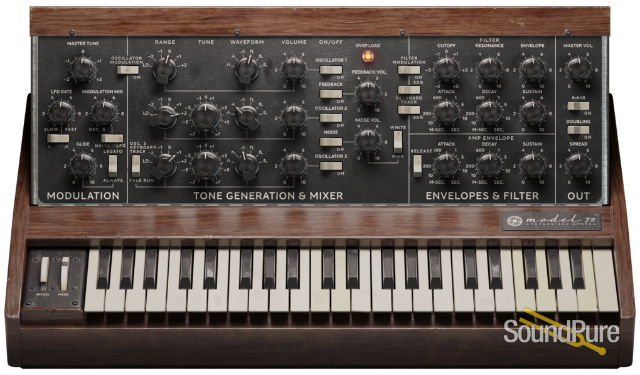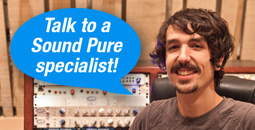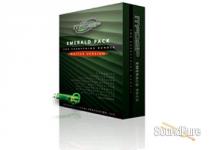-
Call Us Toll Free888-528-9703
-
Local/International (+1)919-682-5552
- Call Us! Toll Free! 888-528-9703
- Local / International (+1) 919-682-5552

$159.00
"Experience the Difference"
 Payments as low as $13/mo.
Payments as low as $13/mo.
Manufacturer's Description from Softube
Imagine traveling in time to the early '70s, an era where new and experimental sounds were shaping pop music and taking it a step further. Softube's Model 72 Synthesizer System is your vintage synth time machine. It's component modeled down to the smallest details from 1972 hardware in pristine condition with all the quirks and non-linearities intact, hence the name Model 72.
The result is incredibly authentic sound, with all the warmth and smoothness heard in countless records. Now imagine this classic has traveled into the future to pick up some contemporary features like doubling and spread to create a stereo like sound image and evolve into a full system with multiple versions for different applications. Wish you were here? Take the Autobahn.
Designed by Experts, Built on Legacy
Softube has a long history of modeling professional gear. After nearly two decades working in collaboration with premium pro audio brands like Tube-Tech, Solid State Logic, Chandler Limited®, Weiss Engineering, and Trident, we have a solid track record recreating indisputable classics in software form that sound precisely like their hardware counterparts. This includes expertise in synthesizer plug-ins like Modular, Statement Lead, and Monoment Bass.
Model 72 is built on this legacy, and we took the same meticulous approach we always do – everything needs to be exact, with skillful recording, precise testing, and fine-tuning to sound exactly like the corresponding hardware or even better in terms of clarity. Nothing less.
Sound Quality: Our First Priority
The Model 72 Synthesizer System's plug-ins and modules are in a class of their own compared with similar software when it comes to sound quality.
Just Like the Original Hardware
Model 72 was created with the same meticulous and accurate component modeling process you’ve come to expect from Softube’s mixing and mastering plug-ins.
Vintage Sound in Different Applications
It has the perfect vintage mojo and includes four versions that can be used in many different applications – as an instrument, as effects, in Modular, and in Amp Room.
A Revolutionary Monophonic Synth
Model 72 is based on a fully modeled vintage monophonic synthesizer that has been a true legend in music instrument history since its introduction in 1970. Affordable, easy to use, and small enough to carry around to studios and gigs, it was the first synthesizer designed for and accessible to musicians and became the archetype for all synthesizers that followed. The sounds it produces can be warm, lush, and luxurious or fat, distorted, and gnarly but not at all ear-piercing.
Modeled from a Pristine Hardware Unit From 1972
The software components of Model 72 were measured and matched down to the smallest details from the original hardware, keeping all of its quirks and non-linearities intact. For example, one trick that's commonly used on the hardware version is connecting a cable from the high-gain output to the external input of the unit to create a roaring, raw, and exciting feedback tone heard on countless records. Obviously, we had to add this feature to the Model 72 Instrument plug-in.
A Classic Synth with Modern Features
We updated this legendary synth with some new features, too. An expansion panel lets you tweak some of the finer details of the oscillator behavior as well as some performance aspects of the synth. The doubling feature adds the effect of having the notes that are played doubled by another Model 72, and the spread feature sets how much this doubling will spread out in the stereo field. These improvements allow you to do even more than you could with the original hardware.
User Interface
Tone Generation & Mixer
The tone generator is the heart of Model 72. This section consists of 3 oscillators, with the top two identical in terms of output waveforms and features and linked to the incoming note information. The third oscillator can be unlinked from the incoming note information and used as a free-running modulation oscillator with extended tuning range on the tune knob, and also features slightly different waveforms. The mixer section consists of 5 switches for turning on and off the different sound sources that mix into the filter and amp sections.
Model 72 Instrument
Use the instrument plug-in on instrument channels controlled via MIDI to create the original sounds this synth is known for. This includes the feedback loop trick, the famous trick of running a cable from the high output to the external input for more overdriven, distorted, and cool sounds. You can use a connected MIDI keyboard controller, or you can edit notes in your DAW to play it. Model 72 will respond to the full range of your keyboard and can also be configured to respond to velocity.
Model 72 FX
Using the synth as an effect by running an external sound source to the external audio input is a common use case heard on countless albums from the 1970s to today. Add the FX plug-in to your audio or mix track to replicate this external input feature and use the distortions and filter on your sound source. Route a MIDI channel to your effect and play a note in order to gate the sound processed through the effect.
Amp Room Ready
The Model 72 Amp Room module consists of the fat sounding filter from this legendary synthesizer complete with envelope follower, cutoff, resonance, and drive. There are two different envelope follower modes, fast and smooth. There's also a mix knob for blending the effect to fine-tune the sound. Create truly unique sounds for guitar, bass, and keyboards with a vintage vibe with this incredible envelope filter effect.
Modular Ready
All the Model 72 Instrument sections are available as individual modules for Softube Modular, ready to be added to your Eurorack system. It’s easy to combine single parts of the synthesizer in a modular workflow to build patches and get authentic vintage monophonic sounds.
In short
- An entire system based on a classic analog monophonic synth from the early 1970s with the emphasis on sound quality
- Era correct: component-modeled to perfection, with all the quirks and non-linearities intact – it sounds and behaves just like its original hardware counterpart
- Actual use cases and tricks of the hardware correctly replicated in the software
- Four versions included: Model 72 Instrument, Model 72 FX, Model 72 module for Softube Amp Room, and seven Model 72 modules for Softube Modular. Learn more about Softube Amp Room and Softube Modular
- Create combinations in Modular never possible before in real life or in the world of software
- Software-exclusive features added: doubler, stereo spread effect, and expanded controls

About Manufacturer
Softube develops both hardware and software for the audio industry. A number of high-end computer recording plug-ins are available under the Softube brand and the company has done development for reputable companies such as Abbey Road Studios and TC Electronic. 2010 marked a new beginning for Softube as Marshall released the JMD:1, a guitar amplifier which contains hardware and software developed by Softube.
The company was founded in 2003 and consists of four guys with the head quarter in Linköping, Sweden. It's located about 2 hours southwest of Stockholm and 1.5 hours away from Stockholm Skavsta Airport.
Specifications
System Requirements
- Ventura 13, Sonoma 14, Sequoia 15
- Windows 10 (64-bit), Windows 11
- Softube account
- iLok account
- Computer with AU, VST, VST3 and/or AAX compatible DAW host software
- Internet access (for downloading installers and managing licenses)











